Stay in the know on all smart updates of your favorite topics.
BewustwordingsModel Smart City

Hoe slim is de ideale leefomgeving wat jou betreft, nu en in de toekomst? Wat betekent dat voor o.a. je strategie, diensten en technologie?
Vanuit phbm voegen we graag een gereedschap toe aan jouw Toolbox voor Smart City-vraagstukken. Eén waarbij we het voorstellings- en inlevingsvermogen activeren en welzijn centraal staat: het BewustwordingsModel. Dit model maakt de positie en wensen van jou en de ander expliciet en voorkomt dat er ruis ontstaat over het niveau van ‘slimheid’ in de leefomgeving. Door de toelichting van de passende organisatie, samenwerking, strategie e.d. bij de niveaus ontstaat een scherp beeld van wat het gekozen niveau betekent voor het individu, de organisatie of zelfs de samenleving als geheel. Eén van de centrale vragen bij het model is: hoe ‘smart’ wil je zijn en waar zit de optimale balans tussen mens en technologie?
Eerste gepubliceerde versie is tot stand gekomen samen met partners in de City Deal (‘Een slimme stad, zo doe je dat’). Het laat op vijf niveaus zien in welke mate een organisatie of bedrijf slim is. Eén van de doelen hiervan is om te bepalen of opdrachtgever en opdrachtnemer dezelfde taal spreken. Vanuit phbm zijn we doorgegaan op het model en hebben onder andere ethiek en mobiliteit als pijlers toegevoegd.
Het model is openbaar inzichtelijk, phbm begeleidt graag in het proces om samenwerkingspartners gezamenlijk bewuster te maken op welk niveau ze staan (gebruikmakend van het model) en met welke ontwikkelingen je rekening kan houden in het vraagstuk wat op tafel ligt (op vlak van organisatie, diensten of ethiek bijvoorbeeld).
Responsible smart doorbells

Photo: Daan Rozinga, The Incredible Machine
The Responsible Sensing Lab is currently working on a few projects regarding smart doorbells.
Smart doorbells are like a security camera's, but available for everyone. Always on, and owned by private parties, the smart doorbell is destined to have an impact on our privacy. As of now, there could be thousands of smart doorbells in Amsterdam, filming public space. We don t have a clear view on the numbers, and we do not know what the owners do with the collected data. Smart doorbell owners are often not aware of the privacy issues.
One of the Responsible Sensing Lab's projects is Shutterring. The Shutterring project aims to make smart doorbells more responsible by ensuring the privacy of bypassers and owners while keeping the main functionality of the device intact. Shutterring is a design by The Incredible Machine.
Inspired by Shutterring, the Lab has started another project regarding responsible smart doorbells: Challenging the design of smart doorbells. In order to challenge the current design of smart doorbells (IoT doorbells with integrated cameras) a few alternative smart doorbells have been created through speculative design. The goal of this project is to kickstart a conversation about how to deal with the presence of smart doorbells in the city of Amsterdam. How could smart doorbells be designed in a way that they align better with the values of the city and its population?
The Responsible Sensing Lab team will present both their smart doorbell projects during the demo day on 11 October. Stay tuned!
Building a shared vision of the city - with LEGO!
Building the largest interactive LEGO model of the future city ever!
Imagine a model of the city; however, instead of a literal representation, this is a sculpture that holds ideas and dreams from citizens, policymakers, entrepreneurs and visitors about what the city might be like after we solve major transitional challenges (e.g. sustainability, energy, equality, smart).
What would it feel like to be in this city? What do people wish this future city to become?
the goal
A model of the city that contains the ideas that a diverse group of people have about how the city might emerge from major transitional change like climate adaptation, sustainability, equality, smart. Imagine the city from what might be and what opportunity change offers.
the form
A room-sized model built with LEGO in a public space and with interactivity (e.g. app / QR link / AR) to share the stories that this model contains.
the process
Lego is an powerful way to evoke and capture stories about how people think about something. Through a series of workshops, people from all parts of the city will be invited to share how they think about the future of the city and capture their stories in a collective model. An interactive installation opens up those stories to passers-by and other participants.
partners
finance, organisational, tech
call to action
Get in touch if you want to contribute to the realisation of the largest LEGO city vision model ever!
Simple Sensors for responsible sensing

City officials require sensor data to optimize operations, plan projects, or measure effects of interventions. Citizens often do not notice the sensors deployed by the City in public space. Also, the benefit for the public is not directly obvious to city residents or immediately shown by the sensing systems in place. Namely, in many cases only after data is processed, it informs an action that affects citizens.
Public concerns about sensors are often connected to concerns about potential action (to be taken by, for example, city officials), and that the action has negative implications. With ‘Simple Sensors’ we address these concerns.
The Simple Sensors project, which is part of the Responsible Sensing Lab, investigates these questions: What if sensors are designed to be seen? What if they communicate clearly what data they collect and how? And what if sensors invite you to interact with them?
Modules for responsible and ‘simple sensing’
Simple Sensors consists of a family of modules, designed by The Incredible Machine, that can be combined: some modules improve transparency over what data is being collected, other modules encourage interaction, and some modules just make it understandable how sensors work. The Simple Sensors family allows the City of Amsterdam to design sensors to fit any context or purpose.
A privacy friendly alternative for CCTV
The first Simple Sensor prototype called millimeter wave (mmWave) has been developed as a proposal for the City’s crowd management sensor at the Marineterrein Amsterdam Living Lab. It consists of four modules: 1) sensor module 2) transmission module, 3) data module, 4) threshold module... Continue reading about the project on our website >>
Shuttercams for a responsible smart city

Shuttercam is a project by Responsible Sensing Lab (RSL), a collaboration between the City of Amsterdam and AMS Institute. In essence, RSL is a testbed for conducting research and experiments on how smart sensing technologies in public space – like cameras – can be designed in a way that makes the digital city 'responsible’.
At the Lab we invite academics and practitioners responsible for digital systems in the city to explore how to integrate social values such as autonomy, privacy and transparency in the design of these sensing systems in public space.
How to know when a camera ‘sees’ you?
The Shuttercam project originated based on the notion that citizens currently can not directly know or see if and when cameras in public space are monitoring you or not. The project also questions the necessity for many non-security related cameras in the city to be switched on indefinitely.
Experimenting with 3 prototypes at Marineterrein
The Shuttercam project will test 3 prototypes. These are installed at Marineterrein Amsterdam Living Lab (MALL) in the upcoming weeks.
First and foremost, the cameras within this project are all part of the crowd monitoring system by the City of Amsterdam, which is a privacy friendly system. So what do these cameras record or see for example?
A crowd monitoring system works with a camera that has an algorithm read out and analyzes video images. In addition to measuring crowds and displaying those crowds in usable numbers, the algorithm can also determine whether people keep a distance of 1.5 meters. All this is done in an anonymous manner that naturally complies with all privacy legislation.
The video images are not watched by a human but are processed automatically. Only a few frames are saved with unrecognizable, blurred people's faces. Those frames help to "train" the algorithm. Furthermore, the images are not saved. Continue reading about the the Shuttercam project >>
Responsible Sensing Lab

Smart city systems can help solve urban challenges. But when collecting data, what public values are involved? The Responsible Sensing Lab explores how to integrate social values such as autonomy, privacy, transparency, inclusiveness and empowerment in the design of sensing systems in public space.
In January 2021 the Responsible Sensing Lab was officially launched during an interactive livestream event. In essence the Lab is a testbed for conducting rigorous, transparent, and replicable research on how our smart technologies placed in public space can be designed in a way that makes the smart city ‘responsible’. Responsible Sensing Lab is a collaboration between the City of Amsterdam and AMS Institute.
A lab for a ‘responsible’ smart city
The City of Amsterdam has many smart technologies in place: from smart devices that measure things (i.e. sensors) to smart devices that steer processes in the city (i.e. actuators) such as traffic lights, charging stations, adaptable street lights, barriers that go up and down, and adaptive digital signs.
At the Responsible Sensing Lab we research, develop and integrate smart technologies like the aforementioned to help solve urban challenges. At the same time, we explore how to embed society’s public and democratic values in the design of these innovations.
(Re)designing, prototype testing and implementing responsible sensing systems
Within the Lab academics are invited to connect and work with practitioners who are responsible for digital systems in the city to (re)design, prototype and test (more) responsible ways of sensing in public space.
Hence, Responsible Sensing Lab is a place where teams of multi-disciplinary stakeholders – such as computer scientists, policy makers, psychologists, designers and hardware experts – can address existing hardware, software and other city sensing systems.
Core values
At the Responsible Sensing Lab, we use the City’s values (TADA, Digital City Agenda) as our starting point. We explore what these values mean when applied to actual software, hardware, user-experience design and governance.
Also, we are inspired by the methodology of value sensitive design. This approach allows us to focus on design choices inherent in the type of sensing hardware, the distribution of intelligence between cloud and back-end, the physical design and placement of sensors in public space, and interaction possibilities for citizens.
Do you want to know more or are you looking to collaborate? Contact us via our website!
Wicked Problems
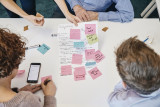
Te wicked? Niet voor ons.
Wij werken allemaal aan urgente, complexe, maatschappelijke uitdagingen. Issues die schier onoplosbaar lijken, van dilemma’s en paradoxen omgeven, nog niet duidelijk hoe het moet. Wel is duidelijk dát het moet, dat we elkaar nodig
hebben en dat we er NU aan moeten beginnen. Om met de woorden van Jan Rotmans te spreken; we leven niet in een tijdperk van verandering maar in een verandering van tijdperk. En hier hoort een nieuwe gereedschapskist bij.
En of je nou aan energietransitie werkt, andere mobiliteitssystemen, creëren van waterstofhubs, peer to peer autodeelsystemen, het maakt niet uit, we zien dat al deze opgaven op enig moment tegen gelijksoortige barrières aanlopen. Op samenwerking, financiering, privacy, onvoldoende aansluiting op de maatschappij, om maar een paar voorbeelden te noemen.
Unieke samenwerking
Als Amsterdam Smart City netwerk willen en kunnen we deze opgaven niet laten liggen. Door het bundelen van onze kennis en expertise kunnen we als netwerk iets unieks bieden en de wil en durf tonen om deze barrières te doorbreken. De betrokken partners die dit uitdenken en begeleiden zijn RHDHV, Kennisland, Drift, NEMO, Arcadis, Alliander, HvA en Metabolic. Zij bundelen hun expertise en ervaring om de echte vragen boven tafel te krijgen, tot nieuwe manieren van samenwerken te komen en barrières te doorbreken. We richten ons met name op de start van de samenwerking. Gezamenlijk ontwikkelen we een ‘wicked problem aanpak’. Op een nieuwe manier, lerend door te doen, exploratief.
Waar moet je aan denken?
Wat is eigenlijk het echte probleem? Wiens probleem is dit? Hoe kijken anderen er tegenaan? Welke andere partijen lijken nodig? Hoe vind je ze? Hoe ga je om met eigenaarschap en botsende frames? Hoe zorg je dat je al in
een vroeg stadium de maatschappij (bewoners, ondernemers, werknemers, etc) betrekt en hun ervaringen in het project trekt? Het wicked problem team zet nieuwe methoden in voor het beantwoorden van deze vragen. En het creëren van de benodigde commitment om het vraagstuk aan te pakken. Niets staat van te voren vast, want we passen ons aan aan wat we tegenkomen. Met elkaar ontwikkelen we een nieuwe aanpak om de barrières te doorbreken.
Blue Force Tracking
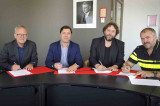
Testing medical certified body sensors to detect unexpected behaviour, triggering an alert, which allows the command & control room to act and better support their fellow officers in the field.
[►
Blue Force Tracking - Nalta Experience #1
How to improve the protection and safety of the Dutch Blue Force using smart Technology?
Nalta built a new innovative Internet of Things solution solving just that. In partnership with the Netherlands Police, the municipality of Amsterdam, Johan Cruijff Arena, Dell Technologies and Dell Boomi we cre
Nalta YouTube](https://www.youtube.com/watch?v=_cyFp_XGLFA)
Conscious Cities

How might we automate access to a public digital ecosystem for citizens and machines in order to grow a conscious city? How might we incentivize all citizens and companies to interact with the public digital ecosystem of the city in order to improve livability, democratic representation and societal engagement?
Read our ecosystem document
Join our online ecosystem platform
Digital Perimeter
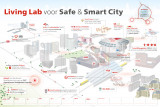
By implementing innovative smart & digital solutions, the digital perimeter allows us to experiment with applications that deliver safety & security while providing the visitor with an even better fan experience.
Please do share your comments and thoughts with us as we are currently exploring our technical options with partners within the eco-system.
5G
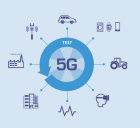
5G will be the new generation of mobile connectivity. The connection will be faster and more reliable, and will bring previously unknown possibilities for citizens and business. Amsterdam is exploring the opportunities and obstacles on the road to a safe and useful 5G network. One of the ways we do this is with our field lab in Amsterdam South East, from the train station to the Johan Cruijff ArenA. But also through regional, national and international collaborations.
The Black Box Bellagio

Welcome to the Black Box Bellagio - an unusual casino that won’t take your money, but is after your freedom, integrity and private data instead. Play with the (un)fairness of expected values, predicted risks, and giving up your identity. Disclaimer: The house always seems to win.
The internet services we think of as free are often paid for with our data: it is the price of access, and is used to determine our treatment and advantages. Our data feeds the algorithms which can unfairly or wrongly categorise, exclude or discriminate against us. The Black Box Bellagio uses the dynamics of a casino to communicate the asymmetry of this relationship. At this casino, like on the internet, your personal data determines the advantages you get, the luck and misfortune you experience, and how much it really costs you to play.
The Black Box Bellagio has been developed by Roos Groothuizen (1992, NL), an Amsterdam/Utrecht-based designer and artist, who cares about digital rights. Fascinated with the unfair distribution of information and how online algorithms systematically discriminate us, her work reflects on in-depth research and recent developments, often with interactive or game-like elements. The Black Box Bellagio has been realized in collaboration with Ymer Marinus and the Waag.
Film documentation from De Nieuwe Anita (May 2018), by Jimena Gauna for Waag:
The Black Box Bellagio at de Nieuwe Anita / Aftermovie
This project has received funding from the European Union’s Horizon 2020 research and innovation programme under grant agreement No. 732546. The Black Box Bellagio is organised as part of DECODE, a project developed by 14 European partners. Through this casino DECODE aims to engage a new group of people in conversations about personal data, privacy and data commons.
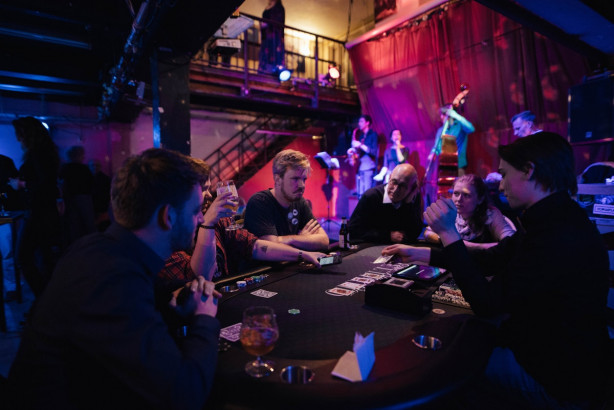
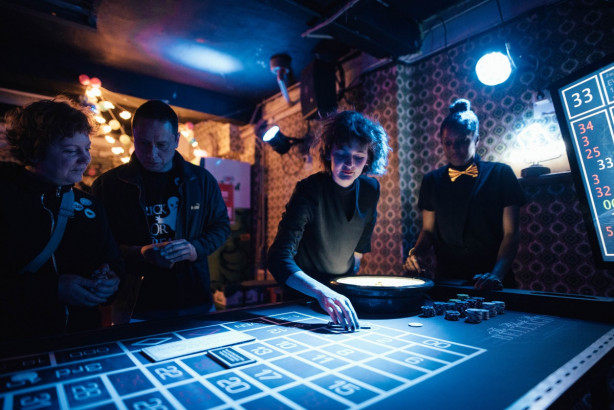
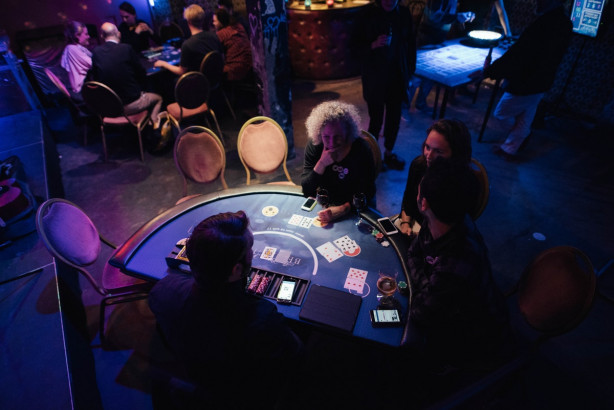
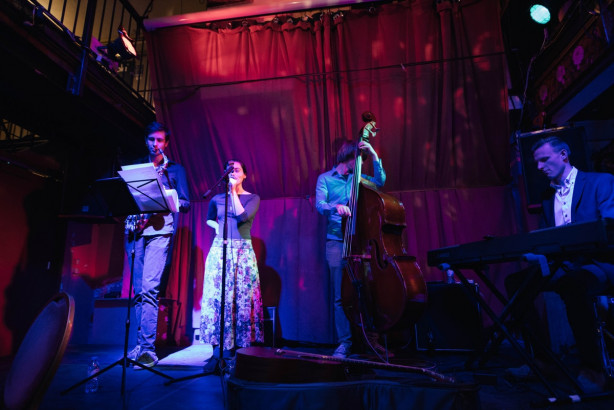
Pictures by Jimena Gauna for Waag
More picture and information: Click here
Onderzoeksproject Catalyst
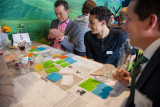
Voor dit onderzoeksproject zijn we nieuwsgierig hoe kunst kan helpen om bewoners en andere stadsgebruikers een mening te laten vormen over de slimme stad.
We doen dat in drie rondes, waarbij we steeds meer de diepte ingaan:
* De eerste ronde vindt plaats op straat; voorbijgangers worden geprikkeld om over de slimme stad na te denken door middel van kunstinstallaties en onzichtbaar theater.
* Ronde twee vindt plaats in buurthuizen; bewoners en andere stadsgebruikers worden gestimuleerd om een mening te vormen over de slimme stad.
* Ronde drie vindt plaats bij het NEMO Science Museum en brengt bewoners in gesprek met slimme stadsmakers, zoals technologieontwikkelaars en beleidsmakers.
Daarbij hebben we steeds drie vragen:
* In hoeverre helpen de kunstinstallaties en theaterstukjes om de slimme stad relevant te maken voor deelnemers? Wanneer ervaren deelnemers het als leuk en belangrijk om een mening te vormen over de slimme stad?
* In hoeverre helpen de kunstinstallaties en theaterstukjes deelnemers om de verbeelding te stimuleren? De slimme stad is voor veel mensen een abstract begrip. Hoe kan kunst helpen om de slimme stad tastbaar en bespreekbaar te maken?
* In hoeverre helpen de kunstinstallaties en theaterstukjes deelnemers om gefundeerde mening te vormen over de slimme stad? wat helpt deelnemers om niet alleen een mening te vormen, maar ook van zichzelf te begrijpen waar deze mening vandaan komt?
We onderzoeken deze vragen op een kwalitatieve manier, namelijk door middel van observaties en interviews. De publieksactiviteiten vinden plaats in Amsterdam tussen september 2018 en januari 2019.
DECODE
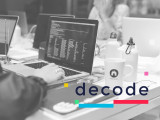
DECODE is an EU funded project to make tools that put people in control of whether they keep their personal information private or share it for the public good.
This project has received funding from the European Union’s Horizon
2020 research and innovation programme under grant agreement No. 732546.
Stay up to date
Get notified about new updates, opportunities or events that match your interests.

